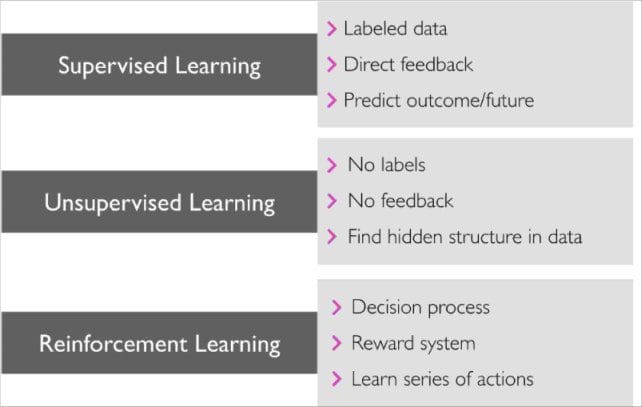3 different types of machine learning
Supervised Learning
The main goal in supervised learning is to learn a model from labeled training data that allows us to make predictions about unseen or future data. Here, the term supervised refers to a set of samples where the desired output signals (labels) are already known.Unsupervised Learning
In unsupervised learning we are dealing with unlabeled data or data of unknown structure. Using unsupervised learning techniques, we are able to explore the structure of our data to extract meaningful information without the guidance of a known outcome variable or reward function.Clustering is an exploratory data analysis technique that allows us to organize a pile of information into meaningful subgroups (clusters) without having any prior knowledge of their group memberships.
Reinforcement Learning
In reinforcement learning, the goal is to develop a system (agent) that improves its performance based on interactions with the environment. Through its interaction with the environment, an agent can then use reinforcement learning to learn a series of actions that maximizes this reward via an exploratory trial-and-error approach or deliberative planning.
source: 3 different types of machine learning hosted on KDnuggets, a site for Machine Learning, Data Science, Data Mining, Big Data, Analytics, AI
Further Reading
Types of Machine Learning Algorithms You Should Know
Terms frequently used in this post:
- Labeled data: Data consisting of a set of training examples, where each example is a pair consisting of an input and a desired output value (also called the supervisory signal, labels, etc)
- Classification: The goal is to predict discrete values, e.g. {1,0}, {True, False}, {spam, not spam}.
- Regression: The goal is to predict continuous values, e.g. home prices.
Essentials of Machine Learning Algorithms
List of Common Machine Learning Algorithms
Here is the list of commonly used machine learning algorithms. These algorithms can be applied to almost any data problem:
- Linear Regression
- Logistic Regression
- Decision Tree
- SVM
- Naive Bayes
- kNN
- K-Means
- Random Forest
- Dimensionality Reduction Algorithms
- Gradient Boosting algorithms
- GBM
- XGBoost
- LightGBM
- CatBoost

No comments:
Post a Comment